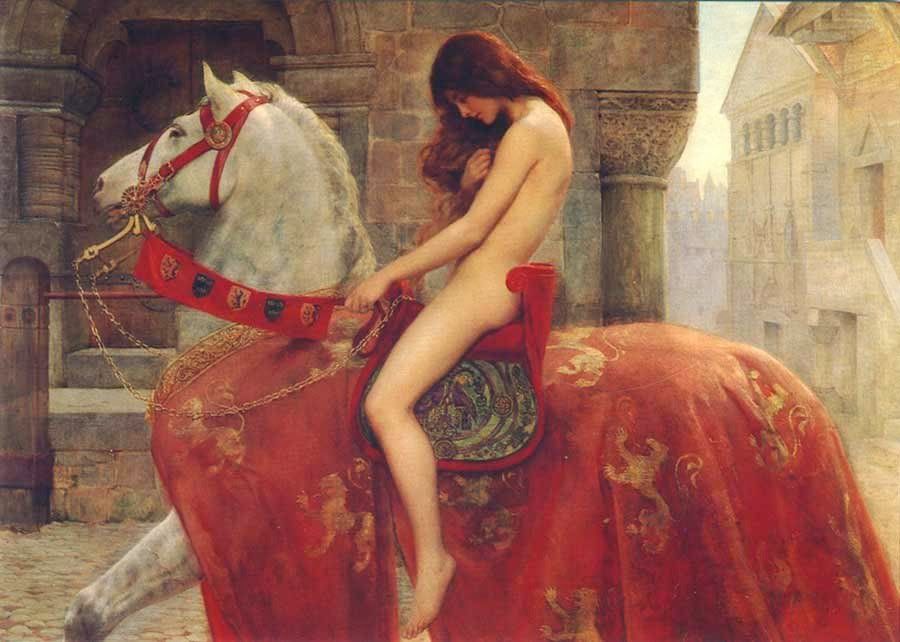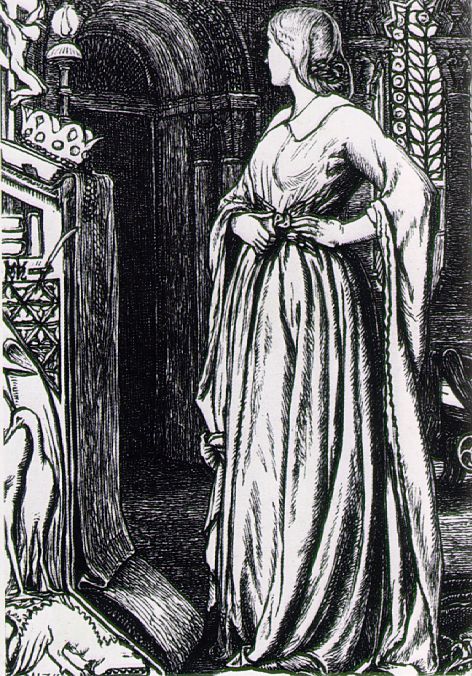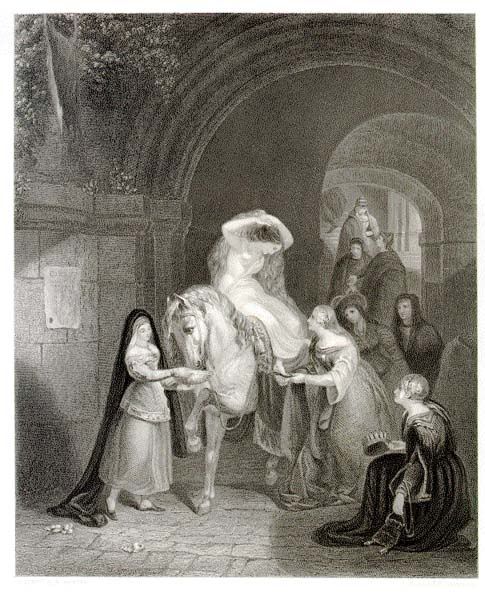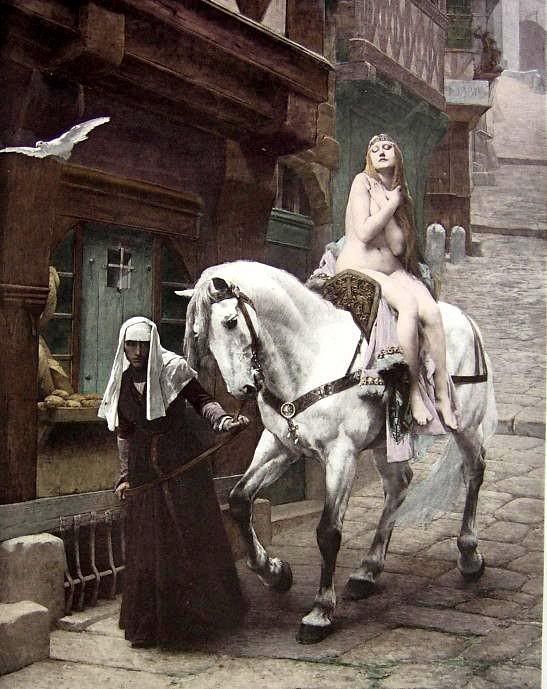Леди Годива
Не потому ль, что я видел на детской картинке
Леди Годиву с распущенной рыжею гривой,
Я повторяю еще про себя, под сурдинку:
"Леди Годива, прощай! Я не помню, Годива..."
О.Мандельштам
Кто не знает историю Леди Годивы, жены лорда Леофрика из Ковентри, который облажил своих подданных непомерной данью? Его жена, умоляя жестокосердного супруга снизить налоги, услышала в ответ, что для этого ей придется голой проехаться по улицам города. Что она и сделала, правда, заранее предупредив горожан, чтобы никто не появлялся на улицах в тот день, чтобы не увидеть ее позор (так был введен первый комендантский час :) ) Только один нахал попытался рассмотреть леди Годиву, за что лишился зрения Божьей волей. Если я не ошибаюсь, этот случай породил выражение peeping Tom.
Я ожидала найти тонну иллюстраций с леди Годивой у прерафаэлитов, но увы, даже мой любимый Уотерхаус на этот раз меня обломил. Но что есть то есть. Под катом несколько изображений этой достославной дамы, а так же потрясающее стихотворение Теннисона, одно из моих самых любимых (он потрясающе описывает ее волнение, когда она едет через город).
Godiva
Alfred, Lord Tennyson
I waited for the train at Coventry;
I hung with grooms and porters on the bridge,
To watch the three tall spires; and there I shaped
The city's ancient legend into this:
Not only we, the latest seed of Time,
New men, that in the flying of a wheel
Cry down the past, not only we, that prate
Of rights and wrongs, have loved the people well,
And loathed to see them overtax'd; but she
Did more, and underwent, and overcame,
The woman of a thousand summers back,
Godiva, wife to that grim Earl, who ruled
In Coventry: for when he laid a tax
Upon his town, and all the mothers brought
Their children, clamoring, "If we pay, we starve!"
She sought her lord, and found him, where he strode
About the hall, among his dogs, alone,
His beard a foot before him and his hair
A yard behind. She told him of their tears,
And pray'd him, "If they pay this tax, they starve."
Whereat he stared, replying, half-amazed,
"You would not let your little finger ache
For such as these?" -- "But I would die," said she.
He laugh'd, and swore by Peter and by Paul;
Then fillip'd at the diamond in her ear;
"Oh ay, ay, ay, you talk!" -- "Alas!" she said,
"But prove me what I would not do."
And from a heart as rough as Esau's hand,
He answer'd, "Ride you naked thro' the town,
And I repeal it;" and nodding, as in scorn,
He parted, with great strides among his dogs.
So left alone, the passions of her mind,
As winds from all the compass shift and blow,
Made war upon each other for an hour,
Till pity won. She sent a herald forth,
And bade him cry, with sound of trumpet, all
The hard condition; but that she would loose
The people: therefore, as they loved her well,
From then till noon no foot should pace the street,
No eye look down, she passing; but that all
Should keep within, door shut, and window barr'd.
Then fled she to her inmost bower, and there
Unclasp'd the wedded eagles of her belt,
The grim Earl's gift; but ever at a breath
She linger'd, looking like a summer moon
Half-dipt in cloud: anon she shook her head,
And shower'd the rippled ringlets to her knee;
Unclad herself in haste; adown the stair
Stole on; and, like a creeping sunbeam, slid
From pillar unto pillar, until she reach'd
The Gateway, there she found her palfrey trapt
In purple blazon'd with armorial gold.
Then she rode forth, clothed on with chastity:
The deep air listen'd round her as she rode,
And all the low wind hardly breathed for fear.
The little wide-mouth'd heads upon the spout
Had cunning eyes to see: the barking cur
Made her cheek flame; her palfrey's foot-fall shot
Light horrors thro' her pulses; the blind walls
Were full of chinks and holes; and overhead
Fantastic gables, crowding, stared: but she
Not less thro' all bore up, till, last, she saw
The white-flower'd elder-thicket from the field,
Gleam thro' the Gothic archway in the wall.
Then she rode back, clothed on with chastity;
And one low churl, compact of thankless earth,
The fatal byword of all years to come,
Boring a little auger-hole in fear,
Peep'd -- but his eyes, before they had their will,
Were shrivel'd into darkness in his head,
And dropt before him. So the Powers, who wait
On noble deeds, cancell'd a sense misused;
And she, that knew not, pass'd: and all at once,
With twelve great shocks of sound, the shameless noon
Was clash'd and hammer'd from a hundred towers,
One after one: but even then she gain'd
Her bower; whence reissuing, robed and crown'd,
To meet her lord, she took the tax away
And built herself an everlasting name.

John Collier. Что-то наводит меня на мысль, что Мандельштам имел ввиду именно эту картину. Рыжая грива точно присутствует.

Иллюстрация Ханта к стихотворению Теннисона.

Corbould

Jones

Lefebvre. Это, наверное, моя любимая иллюстрация. Насколько я понимаю, согласно легенде лорд Леофрик сделал жене такое предложение, потому что посчитал что она постыдится сделать такое. Мол, и унизитильно, и грех впридачу. Но здесь же леди Годива, судя по всему, неплохо проводит время :)